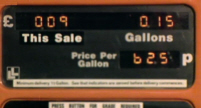Oil Crisis
A month before the royal wedding the Middle East had erupted, as Israel’s Arab neighbours launched a stunning surprise attack. This wasn’t some local scuffle. This was a conflict that would shake the world. The oil crisis was a single decisive moment of the 1970s. It was the tipping point, the catalyst that changed everything, including our sense of who we were and where we were going.
Furious at the West’s support for Israel, the Arab oil nations announced an eye-watering price rise of 70%. And in the storm that followed, no country was safe. Almost overnight, Britain’s motorists faced the prospect of spiralling prices and crippling shortages.
Rocketing Fuel Prices and Soaring Inflation
Newsreader “The era of cheap petrol is over. Today, for £1, the petrol that goes into your tank is little more than 1.5 gallons.”
For people who’d grown up after the Second World War, rising living standards had been a fact of life. One of the cornerstones of the affluent society had been cheap motoring for all, and now that was gone.

This crisis wasn’t just about petrol, it was about power. Britain had once been the imperial master of the Middle East. But now, economically speaking, the boot was on the other foot and it was the Arabs who were doing the kicking. The new Masters of the universe where men like the super slick Saudi petroleum Minister, Sheikh Yamani.
Sheikh Yamani Petroleum Minister
Sheikh Yamani “The era of a very cheap source of energy is gone. And this is a new era. Now don’t expect the producers to accept something much lower than what the market forces will indicate for their oil.”
Oil has reshaped the money map of the world. By the end of this year alone these countries will have earned £40 billion. £40,000,000,000. The noughts dance away almost to infinity.

This was the moment when globalisation really caught up with the nation that had ruled the waves. Almost overnight, people realised that Great Britain was merely a small and frankly rather weak link in a vast economic chain. For people who’d grown up believing in an age of imperial glory, the reality of that impotence was a terrible psychological shock.
Visible Power Shift
Visible evidence of this great power shift could be found on the streets of London, a declining capital already turning into a playground for the international super rich.
TV commentary “This Sunday, the Sunday Times looks at the phenomenal wealth of Britain’s newest millionaires, the oil Sheikhs of Arabia. They are buying our hotels, stately homes and flats in Mayfair, antiques, jewellery and works of art. They are giving a new meaning to the phrase Buy British.”

Oil rich customers from the middle east are investing in chunks of British real estate with gay abandon most people only show when they are playing Monopoly. With the Arab invasion the old game has undergone a case of Mecca-morphosis.
This new oil elite weren’t just driving up London property prices. They were hitting Britain where it hurt, in the pocket. Oil was a fuel on which the affluent society depended. So when the price went up, the economic effects were devastating. Anything made with a lot of oil, like say plastics or artificial fibres, automatically became a lot more expensive. That pushed up demand for the alternatives, for things like wool or wood or cotton. And that in turn pushed up the price of things like shoes or furnishings or clothes.
After decades of endless growth, most people had never known anything like it. With household essentials soaring in price and inflation hitting double figures, in the autumn of 1973, ordinary families struggled.
External Links
International Business Times: Oil Crisis Report
